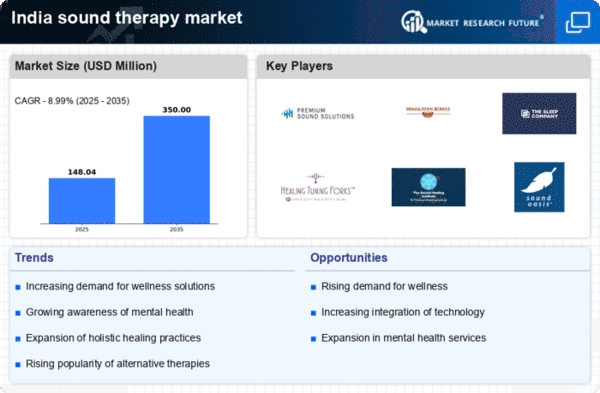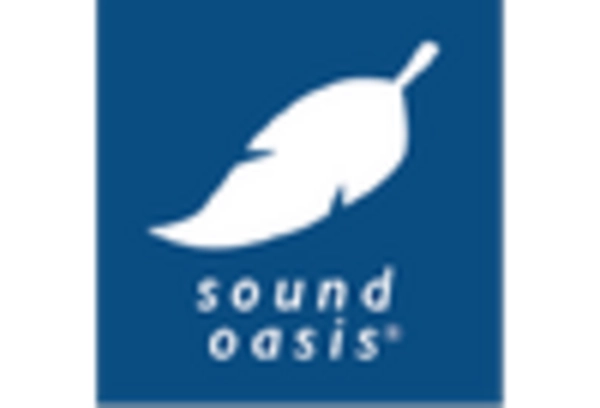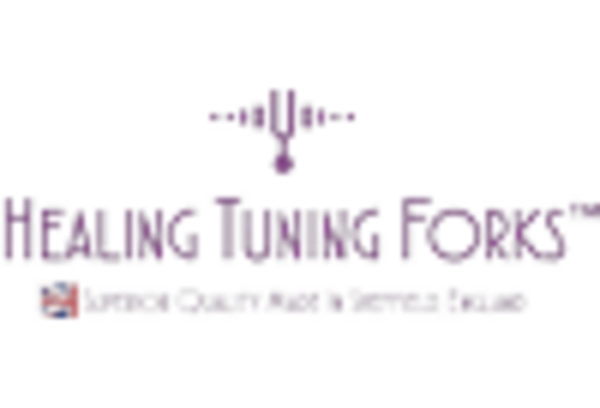Rise of Digital Platforms for Therapy
The proliferation of digital platforms in India is transforming the sound therapy market. With the advent of mobile applications and online therapy sessions, access to sound therapy has become more convenient for consumers. Reports indicate that the use of telehealth services has surged, with a significant portion of the population utilizing online platforms for mental health support. This shift towards digital solutions is likely to enhance the reach of sound therapy, making it accessible to a broader audience. Furthermore, the sound therapy market is witnessing the emergence of innovative applications that offer personalized soundscapes and guided sessions, catering to individual needs. This digital transformation may not only increase consumer engagement but also foster a new generation of sound therapy practitioners who leverage technology to enhance therapeutic outcomes.
Government Initiatives Supporting Wellness
The Indian government has been actively promoting wellness and alternative medicine, which positively impacts the sound therapy market. Initiatives aimed at enhancing mental health awareness and promoting holistic health practices are gaining traction. For instance, the Ministry of AYUSH has been advocating for the integration of traditional practices with modern therapies. This governmental support is likely to create a conducive environment for the sound therapy market to flourish. Additionally, funding for research and development in alternative therapies is on the rise, potentially leading to more evidence-based practices in sound therapy. As the government continues to endorse wellness initiatives, the sound therapy market may see increased legitimacy and acceptance among healthcare providers and the general public.
Increasing Demand for Alternative Therapies
The sound therapy market in India is experiencing a notable increase in demand for alternative therapies. As individuals seek holistic approaches to health and wellness, sound therapy emerges as a viable option. This trend is particularly pronounced among urban populations, where stress and anxiety levels are high. According to recent surveys, approximately 30% of urban dwellers express interest in alternative therapies, including sound therapy. This growing inclination towards non-invasive treatment methods is likely to drive the sound therapy market forward. Furthermore, the integration of sound therapy into wellness centers and spas is becoming more common, indicating a shift in consumer preferences towards natural healing modalities. The sound therapy market is thus positioned to benefit from this increasing demand, as more practitioners and facilities adopt sound-based healing techniques.
Focus on Mental Health and Stress Management
The increasing focus on mental health and stress management in India is a crucial driver for the sound therapy market. As societal awareness of mental health issues rises, individuals are actively seeking effective methods to cope with stress and anxiety. Sound therapy, known for its calming effects, is gaining recognition as a beneficial tool for mental well-being. Recent surveys indicate that nearly 25% of individuals report using sound therapy techniques to manage stress. This growing acceptance is likely to propel the sound therapy market forward, as more people turn to sound-based interventions for relief. Additionally, collaborations between mental health professionals and sound therapists may enhance the credibility of sound therapy, encouraging wider adoption among those seeking mental health support.
Cultural Acceptance of Sound Healing Practices
In India, there is a rich tradition of sound healing practices, which contributes to the cultural acceptance of the sound therapy market. Ancient practices such as chanting, mantra recitation, and the use of musical instruments for healing have been integral to Indian culture for centuries. This historical context provides a strong foundation for the modern sound therapy market, as individuals are more likely to embrace these practices. Recent studies suggest that approximately 40% of the population is open to exploring sound therapy as a complementary treatment. The sound therapy market can leverage this cultural affinity to promote its services and educate the public about the benefits of sound healing. As awareness grows, the market may witness an influx of practitioners and consumers alike, further solidifying its place in the wellness landscape.

















